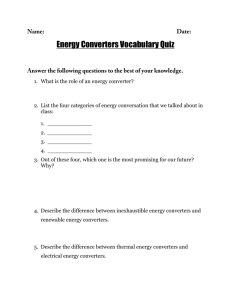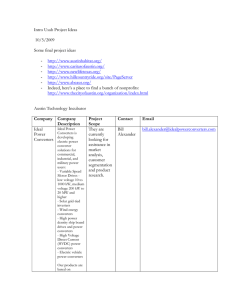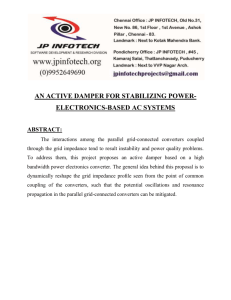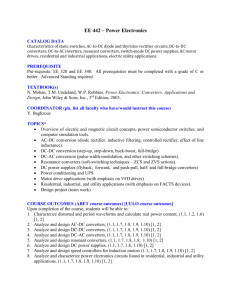ECE 534 Fundamentals of Power Electronics and Utility Applications
advertisement
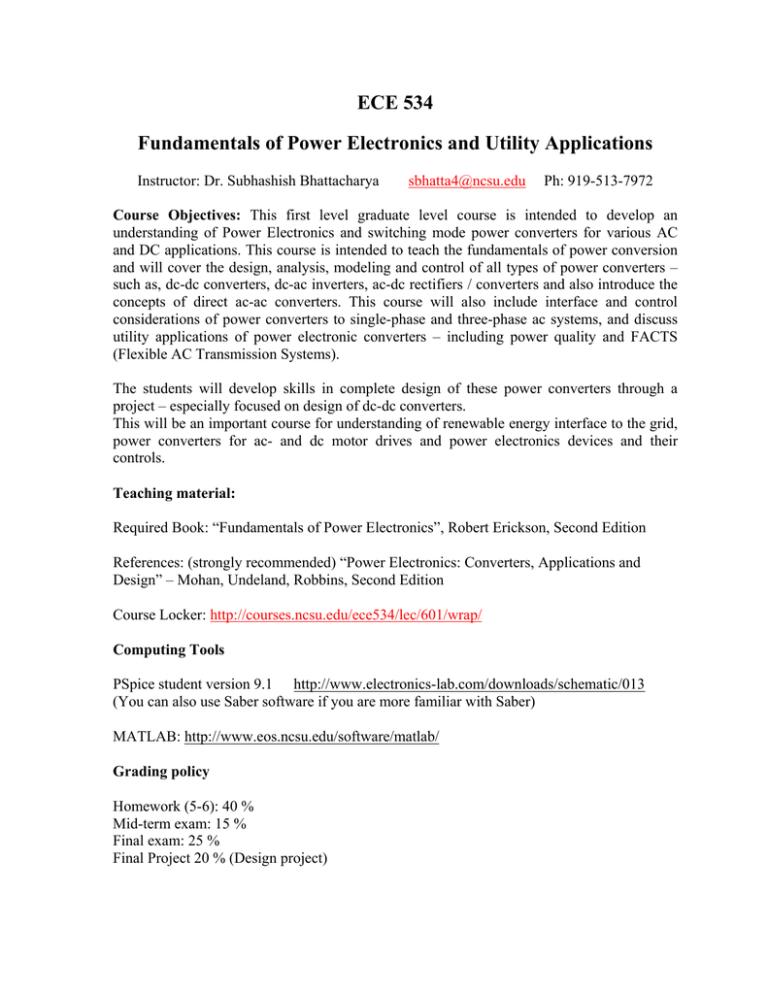
ECE 534 Fundamentals of Power Electronics and Utility Applications Instructor: Dr. Subhashish Bhattacharya sbhatta4@ncsu.edu Ph: 919-513-7972 Course Objectives: This first level graduate level course is intended to develop an understanding of Power Electronics and switching mode power converters for various AC and DC applications. This course is intended to teach the fundamentals of power conversion and will cover the design, analysis, modeling and control of all types of power converters – such as, dc-dc converters, dc-ac inverters, ac-dc rectifiers / converters and also introduce the concepts of direct ac-ac converters. This course will also include interface and control considerations of power converters to single-phase and three-phase ac systems, and discuss utility applications of power electronic converters – including power quality and FACTS (Flexible AC Transmission Systems). The students will develop skills in complete design of these power converters through a project – especially focused on design of dc-dc converters. This will be an important course for understanding of renewable energy interface to the grid, power converters for ac- and dc motor drives and power electronics devices and their controls. Teaching material: Required Book: “Fundamentals of Power Electronics”, Robert Erickson, Second Edition References: (strongly recommended) “Power Electronics: Converters, Applications and Design” – Mohan, Undeland, Robbins, Second Edition Course Locker: http://courses.ncsu.edu/ece534/lec/601/wrap/ Computing Tools PSpice student version 9.1 http://www.electronics-lab.com/downloads/schematic/013 (You can also use Saber software if you are more familiar with Saber) MATLAB: http://www.eos.ncsu.edu/software/matlab/ Grading policy Homework (5-6): 40 % Mid-term exam: 15 % Final exam: 25 % Final Project 20 % (Design project) Course Syllabus (weekly topics): 1. Introduction Chap. 1 – Power Conversion Principles 2. Steady-State Converter Analysis – Principles 2.1, 2.2 3. Steady-State Converter Analysis – Basic Circuits 2.3, 2.5, 2.6 4. Steady-State Converter Modeling Chap. 3 5-6. Power Semiconductor Switches; Average and Small-Signal Models of PWM Converters Chapters 7.1, 7.2, 7.4, 7.6 6-7. Converter Transfer Functions Chap. 8 7-9. Output Feedback Control Design Chap. 9, Current Programmed Control – Chap 12 10. Non-isolated and isolated DC-DC Converter Topologies 6.1 - 6.5 11. Line Frequency Diode Rectifiers – single-phase and 3-phase, PWM Rectifiers 12-14. PWM Inverters – single-phase and 3-phase; Applications in UPS, Motor drives, Utility Applications (power quality & FACTS), Utility interface issues – e.g. PV (solar) 15. Basic Magnetics Theory 13.1-13.3, 13.5, Inductor design principles 14.1, 14.2 Project: Focus on design, analysis, modeling and control of dc-dc converters, dc-ac inverters, ac-dc rectifiers / converters and also into ac-ac converters.
